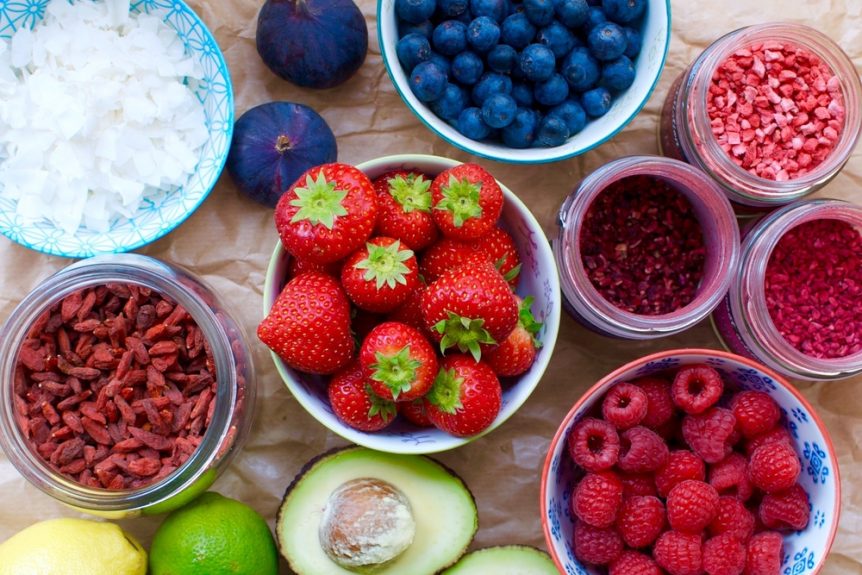
The link between chronic inflammation and weight gain
There’s a secret weight-loss saboteur lurking within your body you might not be aware of. Stress can cause it. So can environmental toxins. Eating a poor diet also leads to it. It’s called chronic inflammation, and it’s rampant and widespread these days. It’s up to you to take preventive measures to stop inflammation in its tracks and keep it from disrupting your well-intentioned weight-loss regimen.
What is inflammation?
Science tells us again and again that there’s a direct link between chronic inflammation and our ability (or inability) to shed excess weight. Chronic inflammation is different from acute inflammation. Think of acute inflammation as your body’s response to an immediate problem — a stubbed toe or bug bite, for example. Your body knows how to heal. Part of that healing process results in a brief and necessary inflammatory response.
Chronic inflammation, on the other hand, lasts longer. It happens internally and over a longer period of time. It’s a response to a larger problem within the body. In addition to weight gain, chronic inflammation has been linked to almost every major disease, including cancer, heart disease, and type 2 diabetes.
Chronic inflammation and leaky gut syndrome
If you’re dealing with chronic inflammation, you will no doubt have digestive issues. Leaky gut syndrome is one such problem. It damages the digestive tract as well as other bodily organs and functions. In fact, joint pain, headaches, lack of energy, thyroid issues, bloating, weight gain, and food allergies and sensitivities are all common symptoms of leaky gut syndrome. Studies show that leaky gut syndrome often results in diabetes and obesity as well.
If you suspect your inability to lose weight has to do with chronic stomach inflammation, consider taking a leaky gut syndrome test. You’re a prime candidate for this test if you’ve been experiencing food sensitivities or other allergic reactions to what you’ve been eating lately. Regular constipation and/or diarrhea are also red flags.
What are common causes of chronic inflammation?
Chronic inflammation can be caused by any one of several factors or a combination of factors. Eating too much sugar and/or processed foods laden with chemicals and pesticides causes chronic inflammation, as does environmental pollution like poor air quality and impure drinking water.
Infections and injuries that are left untreated can lead to chronic inflammation, as can autoimmune disorders like lupus, arthritis, and type 1 diabetes. Long-term exposure to polluted air, industrial chemicals, and other irritants are other common causes of chronic inflammation.
Obesity, smoking, alcohol, chronic stress, and nutritional deficiencies are all found to contribute to chronic inflammation. Chronic stress increases the body’s levels of the stress hormone cortisol, which has been linked to higher amounts of belly fat. Deficiencies in vitamin B6, vitamin B12, and vitamin D are also linked to inflammation and weight gain.
As you probably realize, it’s tough to stay inflammation-free in our modern world. However, there are ways to decrease chronic inflammation while supporting your efforts to lose weight.
What are the best anti-inflammatory foods?
To reduce inflammation, make sure your diet contains plenty of clean water, organic fruits and vegetables (especially berries and leafy greens), wild-caught fatty fish like salmon, grass-fed meats, avocados, coconut products, and fermented foods like kimchi, sauerkraut, and kombucha.
Berries like blackberries, blueberries, and raspberries contain anti-inflammatory compounds called anthocyanins. These are antioxidants that naturally reduce the risk of diseases such as cancer.
Fatty fish contain high amounts of omega-3 fatty acids that offer anti-inflammatory effects and that help reduce the risk of heart disease, kidney disease, and diabetes. In addition to wild-caught salmon, try eating more fatty fish such as tuna, mackerel, sardines, herring, and anchovies.
Other foods that work great at fighting and reducing inflammation include cruciferous veggies like broccoli, cauliflower, and kale, different types of peppers, mushrooms, olives and olive oil, and green tea.
Can probiotics help reduce inflammation?
Probiotics are good, healthy bacteria that help crowd out the bad gut bacteria that contribute to inflammation. Countless studies show that consuming foods and supplements containing probiotics can help reduce inflammation. Probiotics also help prevent complications related to long-term use of antibiotics.
Foods that contain probiotics include yogurt with active or live cultures, kefir, kombucha, sauerkraut, kimchi, tempeh, miso, and cottage cheese. Many of these foods can be found at most health food stores. Before buying these foods, read the ingredients labels thoroughly to make sure they don’t contain added sugar or other harmful additives that could cancel out their healthy, anti-inflammatory benefits.
Which foods contribute to inflammation?
It’s important for everyone to eliminate toxic, inflammatory foods from their diet. These include refined oils, artificial sweeteners, MSG, processed foods, sugars, conventional dairy products, and gluten. Research shows that proteins in wheat are linked to inflammatory bowel disease as well as conditions such as multiple sclerosis, asthma, and rheumatoid arthritis.
Sugar is also a strong driving factor of inflammation and weight gain. Consuming just one sugar-sweetened beverage per day like fruit juice can lead to an increase in insulin resistance, LDL cholesterol, and c-reactive protein — a type of protein made by the liver that is sent into the bloodstream in response to inflammation.
Inflammatory foods are found to increase the body’s acid production, which leads to inflammation. Coffee, soda, potato chips, alcohol, dairy products, and processed meats contribute to the formation of acid and are linked to inflammation and weight gain.
You deserve to maintain a healthy weight without powerful saboteurs standing in your way. Eating a clean diet and drinking pure water are some of the best ways to stop inflammation in its tracks and achieve the weight loss goals you’re after.
What are the best ways to reduce inflammation?
Eating healthy, anti-inflammatory foods is the first major lifestyle change you can make to naturally fight chronic inflammation. However, changes to your diet alone may not be enough if other health conditions are preventing your body from responding properly to anti-inflammatory foods.
For instance, hormonal imbalances can interfere with the way your body processes and responds to food. Leaky gut syndrome, cystic fibrosis, Crohn’s disease, and some weight-loss surgeries can all cause malabsorption and prevent your body from absorbing important nutrients and antioxidants from healthy foods.
Aside from eating healthier foods, other things you can do to reduce chronic inflammation include getting plenty of quality sleep and staying physically active. Ten to 15 minutes of sunlight exposure per day can help fight inflammation, since vitamin D helps regulate the immune system. Vitamin D deficiency has been linked to inflammation.
Reduce your exposure to toxins and chemicals, since these substances contain free radicals that contribute to inflammation. Switch to using non-toxic or organic household cleaners, cosmetics, water bottles, and pesticides, and avoid anything that contains phthalates, BPA, and other harmful chemicals. Also, stay away from secondhand smoke, and talk to your doctor about effective smoking cessation methods if you’re a smoker who needs help quitting.
Stress-relieving practices such as meditation, yoga, and deep breathing may also help reduce inflammation, as can intermittent fasting. Intermittent fasting is when you cycle between periods of eating and fasting. For example, you may choose to eat only between the hours of noon and 8 p.m., and fast for the remaining 16 hours of the day. By giving your digestive periods of rest, intermittent fasting helps reset the metabolism and reduce inflammation.
What supplements can I use to fight inflammation?
Nutritional supplements can be a great way to make sure you’re getting the recommended daily intake of certain vitamins and nutrients that help combat inflammation.
Alpha-lipoic acid works as an antioxidant to protect cells from damage and inflammation. This supplement produces no damage when used at the daily recommended dosage of between 300 and 600 mg.
Curcumin offers a range of health benefits that include lower levels of inflammation related to arthritis, heart disease, and cancer. Curcumin actually comes from turmeric — which is commonly used to treat inflammatory conditions like Alzheimer’s disease and arthritis. Try adding turmeric to soups and stir-fries. If you don’t like eating turmeric, you can find it in some nutritional supplements.
Fish oil supplements can help you reach the daily recommended intake of between one and 1.5 grams of omega-3s, which is useful for those who don’t have access to wild-caught fresh fish. Ginger supplements are well known for improving digestion and gut health, along with reducing inflammation.
Resveratrol is an antioxidant found in purplish fruits like grapes and berries, and may help reduce inflammation related to insulin resistance, gastritis, and heart disease. Spirulina is another antioxidant that strengthens the immune system and help combat inflammation, and offers no side effects when used at the recommended dosage of 1–8 grams per day.
Green tea has been found to improve inflammation in people who suffer from metabolic disorders, and may also help prevent or reduce symptoms of arthritis. Green tea can be naturally sweetened using lemon or grapefruit juice.
How can inflammation be treated?
You may be able to treat inflammation on your own by adopting healthy lifestyle behaviors and staying consistent with those behaviors.
Exercising regularly will help you lose excess weight and naturally fights inflammation. Getting plenty of quality sleep will help you feel more energetic and balance your hormones so you can stay active and reduce inflammation. Eating a diet full of anti-inflammatory foods will also go a long way toward helping you fight inflammation.
Sometimes, medical interventions are needed to help you reduce inflammation. Your doctor may prescribe medications that fight inflammation, such as NSAIDs or corticosteroids. However, long-term use of NSAIDs may actually worsen or trigger inflammation and serious health conditions including asthma, kidney damage, heart attack, and stroke. Talk to your doctor about all potential side effects and risks of using these medications to treat inflammation.
How can inflammation be prevented?
The best way to prevent inflammation is to practice a healthy lifestyle and be proactive about your health. Don’t wait until you’re diagnosed with an inflammatory health condition or until you gain more weight before deciding to make healthy lifestyle changes.
Stop consuming high amounts of sugar, and use natural sweeteners like honey, stevia, or monk fruit when you crave something sweet. Stop using vegetable and corn oils, and switch to using healthy oils like olive, coconut, and avocado oils. Start exercising daily, even if you’re starting out slow with a walk around the neighborhood. Exercise also helps minimize and prevent stress.
Also, stop consuming cow’s milk and dairy products, and switch to healthier alternatives like almond or coconut milk. Stay away from frozen foods, fast foods, and any processed foods that come in boxes and packages. Instead, stick to buying fresh meats and load your shopping cart with just about everything in the produce section.
Aim to get at least 7 hours of sleep every night, and invest in your sleep environment if you’re not comfortable. Buy a new mattress, new sheets, a white noise machine, or blackout curtains if they’ll help you sleep better at night. Take nutritional supplements to get the amount of vitamins, minerals, and antioxidants your body needs to stay inflammation-free, and minimize the number of medications you use.
Need help reducing inflammation and meeting your weight-loss goals? SmartFit Weight Loss offers personalized weight-loss plans to help you look and feel your best. Contact us today to schedule a no-cost consultation!
This post was originally published in June, 2018, and has been updated for freshness, accuracy, and comprehensiveness.
Thank You For Choosing OB/GYN Associates Of Alabama & SmartFit Weight Loss.
Please complete our form or call us at (205) 271-1600 for general questions or to get started.


